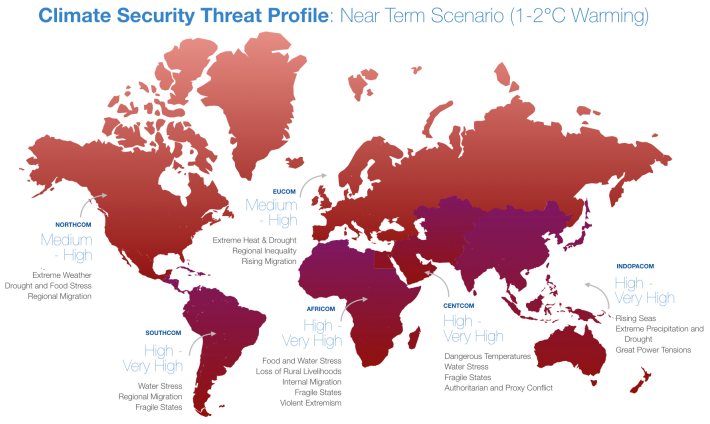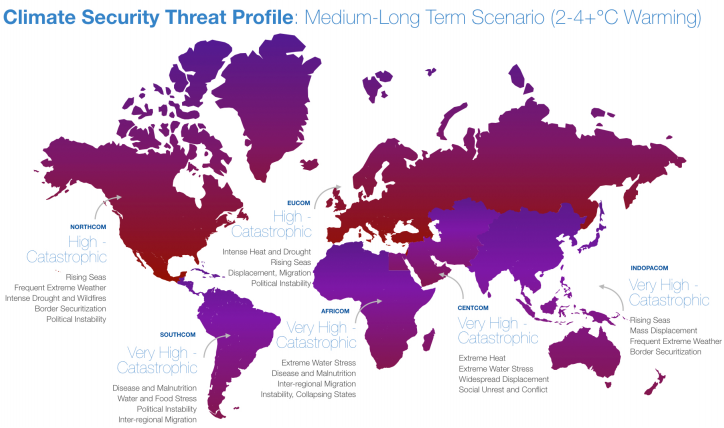This report by the National Security, Military and Intelligence Panel presents a thorough assessment of the impact of climate change worldwide. A group of security, military and intelligence professionals dedicated their expertise to examine and predict the security threats imposed by global climate change at two warming scenarios. The report confirms that climate change is the most pressing threat to global security in the 21st century, and likely to impose catastrophic security risks if states do not act immediately.
“Climate change is an evolving and multidimensional threat, caused by no single actor, but perpetuated by current human systems of energy, transportation, agriculture, and resource use.”
Potentially irreversible impact:
Even at scenarios of low warming, all regions of the world would face security risks in the next three decades. Regions that are at risk of higher temperatures will face severe and likely permanent security risks that put human lives into greater danger. If global emissions not controlled, the world will witness disrupting transformations in both near and long terms. These transformations will pose significant threats to vulnerable regions, mostly and potentially irreversible. At low levels of warming, dry and arid regions, least-developed countries, and small island states will be hit hardest. These regions are already militarily engaged; hence the impact of climate change will further destabilize their fragile peace. At all warming scenarios, industrialized regions will face substantial hazards as well. These regions will likely witness harmful security threats, including the failure of security institutions and a high level of migration.
The report evaluates separate threat profiles and threat assessments for each region of the world:
Near Term Scenario: temperature rises (1 - 2°C). Timeframe (now – 2050)
Threat Profile: climate change impact is very high on global security. Critical and comprehensive prevention and preparation actions are recommended to avoid this substantially destabilizing security scenario.
Threat Assessment: The world is very likely to encounter extreme levels of climate security threats which will disrupt vital security environments, institutions, and infrastructure. This threat will result in resource scarcity, population migration, and social and political catastrophes are expected to interact at a worldwide level. Powerful and recurrent climate shocks will have a destabilizing impact on regions vulnerable to insecurity, displacements, conflict, and whose stability is fragile due to underlying geographic and natural resource vulnerabilities.

Medium-Long Term Scenario: temperature rises (2 - 4°C). Timeframe (2050 – 2100)
Threat Profile: climate change impact is very catastrophic to global security. Preventing this scenario will require thorough and critical global actions to reduce the scale and extent of climate change and to adapt to inevitable threats.
Threat Assessment: the world is very likely to experience major insecurity and deterioration at the local, regional, and international levels. All regions will be exposed to catastrophic levels of climate security threats, the consequences of which could lead to the failure of security and civilian infrastructure, economic and resource instability, and political institutions collapse at a large scale.

This report is made in collaboration with the Council on Strategic Risks (CSR) and the Center for Climate and Security (CCS).
Read the full report here.
Photo credit: Alex Proimos/ Flickr



